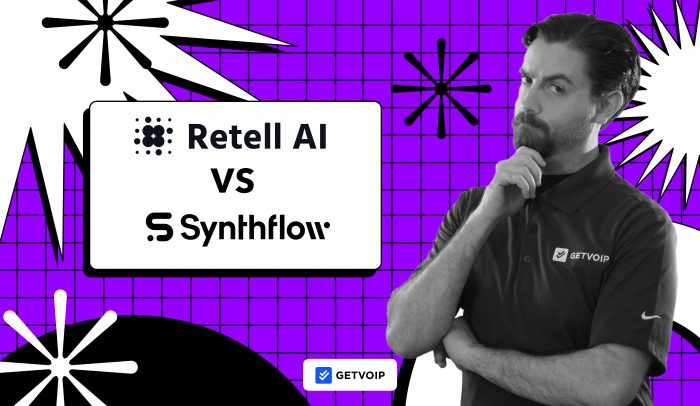Our verdict: Both Retell and Synthflow deliver well-designed AI voice agents for handling inbound and outbound calls, but they handle significantly differently when it comes to every category we tested for. Synthflow came out swinging as the stronger overall choice thanks to its no-code visual builder, transparent pricing structure, and streamlined onboarding process that lets teams go live with a significantly lower chance of technical snafus and mishaps.
Both platforms process voice conversations using natural language capabilities, yet Synthflow's straightforward setup stands out against Retell's more technically demanding requirements. Retell requires developers to work with code-based integrations and API configurations even for fundamental implementations, creating friction for non-technical teams. That said, Retell does shine in its mid-call API capabilities, which enable developers to construct highly specialized workflows with fine-grained control.
For organizations simply seeking to deploy without deep technical expertise, Synthflow proves more accessible through its visual workflow builder, 14-day free trial, and dedicated Slack support for onboarding. Conversely, teams with substantial development resources and complex integration demands may find Retell's API-first architecture worth the learning curve.
- How We Compared
- At a Glance
- Direct Comparison
- Pricing and Plans
- Who Should I Choose?
- Is There a Winner?
How We Compared Retell vs Synthflow
We evaluated both platforms as AI receptionists across the following categories:
- Pricing and Plans: We examined each provider's billing methodology, with particular focus on per-minute charges versus fixed tiers, any lurking fees, and scalability for smaller businesses up through enterprise deployments. We checked the availability of free trials and their associated limitations.
- Call Handling Capabilities: We assessed what exactly was the simultaneous call capacity on both platforms, perceived quality of conversations, 24/7 availability (if it was true) and depth of diverse and accessible multilingual support.
- Appointment Scheduling: We evaluated calendar integrations, booking flexibility, confirmation systems, and rescheduling workflows.
- Lead Management & Qualification: We assessed lead screening tools, qualification workflows, CRM integration depth, and follow-up automation.
- Analytics & Reporting: We perused through the range of actionable call insights, performance metrics, and dashboard functionality.
- Integrations: We tested CRM compatibility, calendar software connections, marketing automation tools, and Zapier/Make connectivity.
- Call Intelligence & AI Customization: We explored voice customization options, learning capabilities, FAQ handling accuracy, and custom scripting capabilities.
- Human Support & Escalation: We examined fallback options, call transfer protocols, complex inquiry routing, and after-hours coverage.
- Customer Support: We made our calls on how each platform fared on knowledge base completeness, available support channels, staff response times, and user satisfaction indicators.
Retell vs Synthflow: At a Glance
| Retell | Synthflow | |
| Base Pricing | $0.07+/min (modular) | $0.08/min (bundled) |
| Setup Complexity | Code-required | No-code visual builder |
| Free Trial | $10 credits (~60 mins) | 14 days |
| Concurrent Calls | Varies by plan | 25–80 calls |
| Call Latency | 500–800ms | <500ms |
| Multilingual Support | Add-on feature | Native (50+ languages) |
| CRM Integrations | Webhook-based | Native connections |
| Best For | Development teams | Business teams |
| Minimum Effective Spend | $3,000+/month | $1,250/month |
| Enterprise Discounts | Yes ($0.05/min possible) | Limited |
Retell employs modular, pay-as-you-go pricing starting at $0.07+ per minute for voice agents, giving it an edge on raw per-minute rates. This is particularly attractive for enterprises negotiating volume discounts down to $0.05/minute. Compare that to Synthflow's easier flat-rate pricing beginning at $0.08/minute. Synthflow manages to bundle transcription, high-quality voices, CRM integrations, and SMS into each plan without additional fees.
Retell's approach offers maximum flexibility for cost-conscious organizations, while Synthflow trades a slightly higher base rate for predictability and included features. Both handle high call volumes capably, though Retell scales call volume with concurrent capacity limits while Synthflow similarly manages concurrency alongside per-minute pricing.
Retell vs Synthflow: Direct Comparison
Retell and Synthflow differ substantially across key functional areas, and we dug into exactly what each platform delivers for common AI voice agent tasks. Here's what we found:
- Call Handling Capabilities: Both handle 24/7 calling, but Synthflow delivers faster response times (sub-500ms latency vs 500–800ms), while Retell requires custom code configuration but scales to 20,000 daily calls for enterprise clients needing massive volume
- Human Support & Escalation: Synthflow includes built-in transfer capabilities through its visual interface, while Retell requires API integrations but offers more granular escalation logic for technical teams
- Lead Management & Qualification: Synthflow provides pre-built qualification templates with native CRM integrations, while Retell demands custom development but delivers complete flexibility through APIs
- Appointment Scheduling: Synthflow includes built-in calendar integrations and booking workflows, while Retell requires custom code for scheduling functionality
- Call Intelligence & AI Customization: Retell offers superior flexibility for technical teams with custom LLM support, while Synthflow provides self-service voice customization and multiple LLM options without developer involvement
- Analytics & Reporting: Synthflow includes built-in dashboards across all plans, while Retell requires businesses to build analytics infrastructure through API exports
- Integrations: Synthflow offers direct CRM integrations with Salesforce and HubSpot plus Zapier connectivity, but to Retell's credit, it provides extensive API access though it requires integration maintenance
Call Handling Capabilities
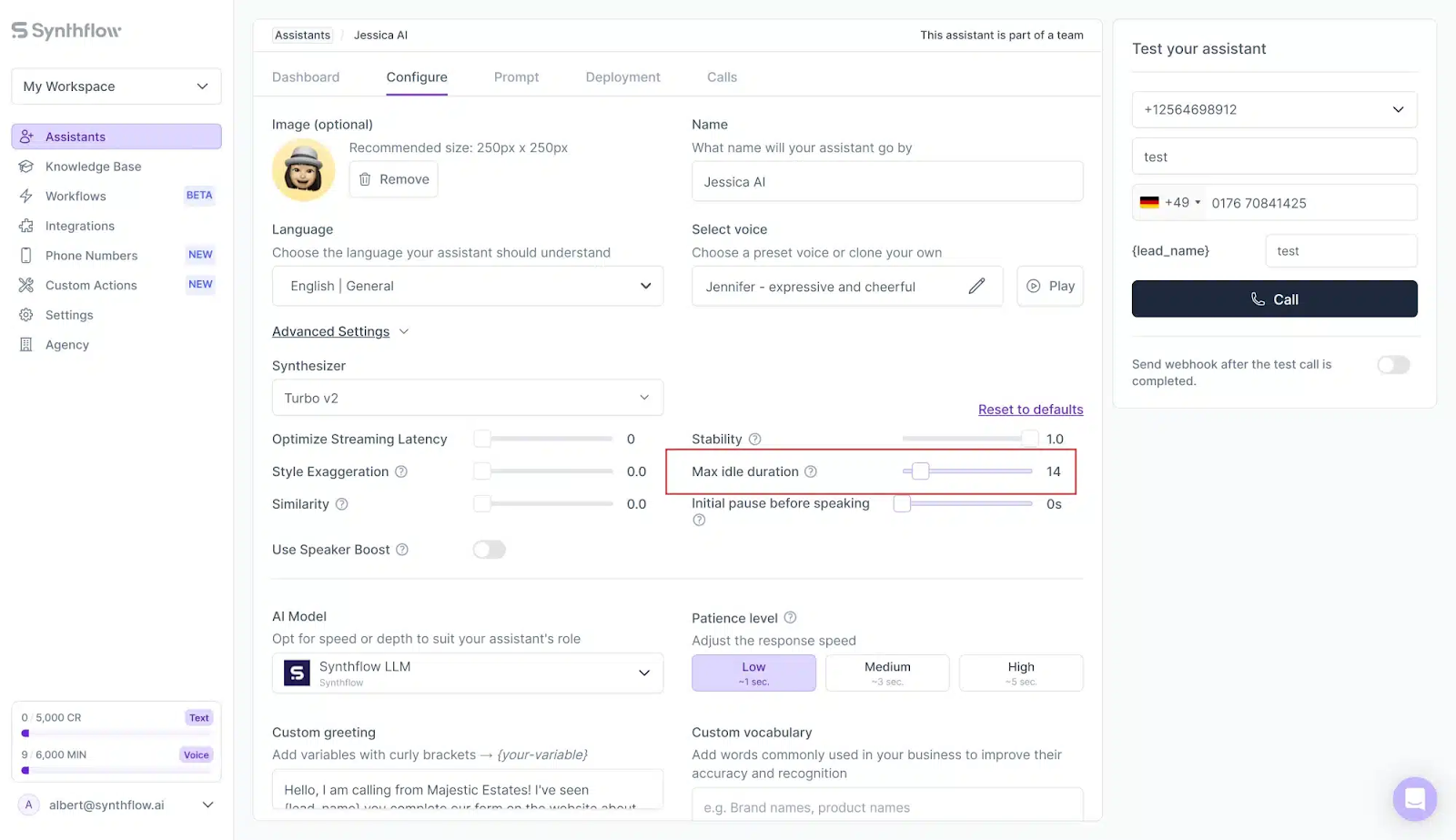
Both platforms provide unlimited calling with round-the-clock availability, though their execution models differ. Retell AI bases voice agent pricing at $0.07+ per minute, while Synthflow starts at $0.08/min with voice, testing, multilingual support, and LLM usage included. Retell can route enterprise clients up to 20,000 calls daily based on concurrent capacity, whereas Synthflow structures limits around concurrent connections: 25 concurrent calls on the Pro plan, expanding to 80 on the Agency tier.
Call quality reveals the most tangible difference between the two. Vapi delivers latency ranging from 550–800ms (a useful benchmark for comparison), while Synthflow delivers consistent latency below 500ms. Retell AI's implementation may require more technical setup, which could delay deployment for businesses without dedicated technical resources. Synthflow feels more natural during conversations with fewer awkward pauses.
Regarding multilingual reach, Retell provides voice cloning capabilities across any language as an add-on feature, though this increases costs. Synthflow delivers under 500ms latency, voice agents that feel fluid, and emotional delivery tuned to task, supporting over 50 languages natively through its integrated voice providers.
Winner: Synthflow - You cannot beat faster response times, simpler pricing transparency, and built-in multilingual support without extra charges. If your organization wants natural-sounding conversations and reliable performance, this is it.
Human Support & Escalation
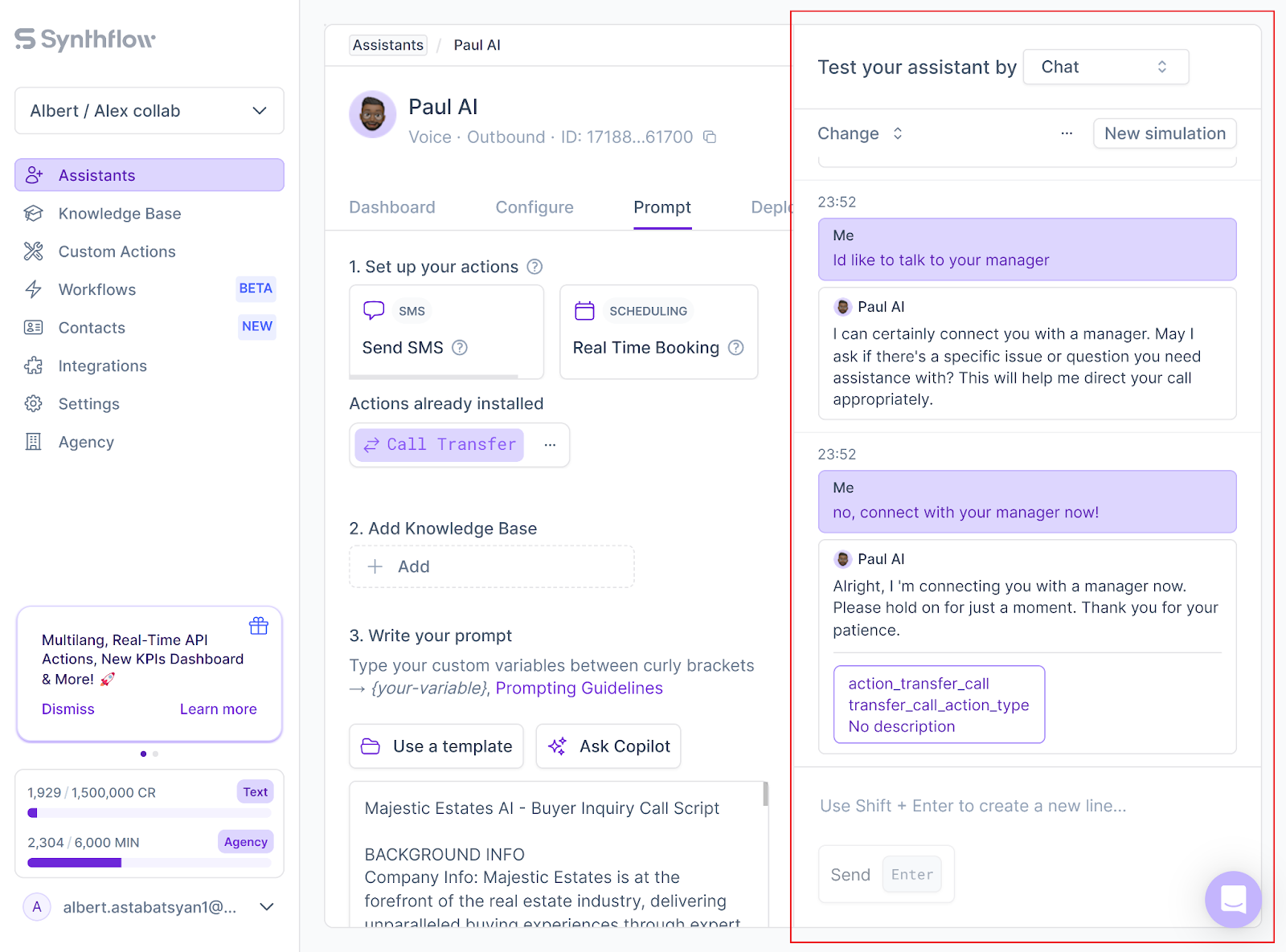
Retell provides Discord and email support, with premium private Slack channels reserved for enterprise accounts. Synthflow offers email, Slack, and account manager support across all tiers. Retell includes basic call transfer capabilities via its API, though complex inquiry and call routing requires custom development work. A big downside for Retell is that there are no SLAs for standard users, and no live ticketing unless you're on the enterprise plan.
Synthflow includes visual fallback logic for handling complex scenarios and offers 30-Day Onboarding & Private Slack Channel support for Agency and Enterprise customers. Call routing and human escalation workflows are built into the no-code builder without requiring API integration.
Winner: Synthflow - Faster support responsiveness and more accessible fallback options for non-technical teams make scaling support operations smoother.
Lead Management & Qualification
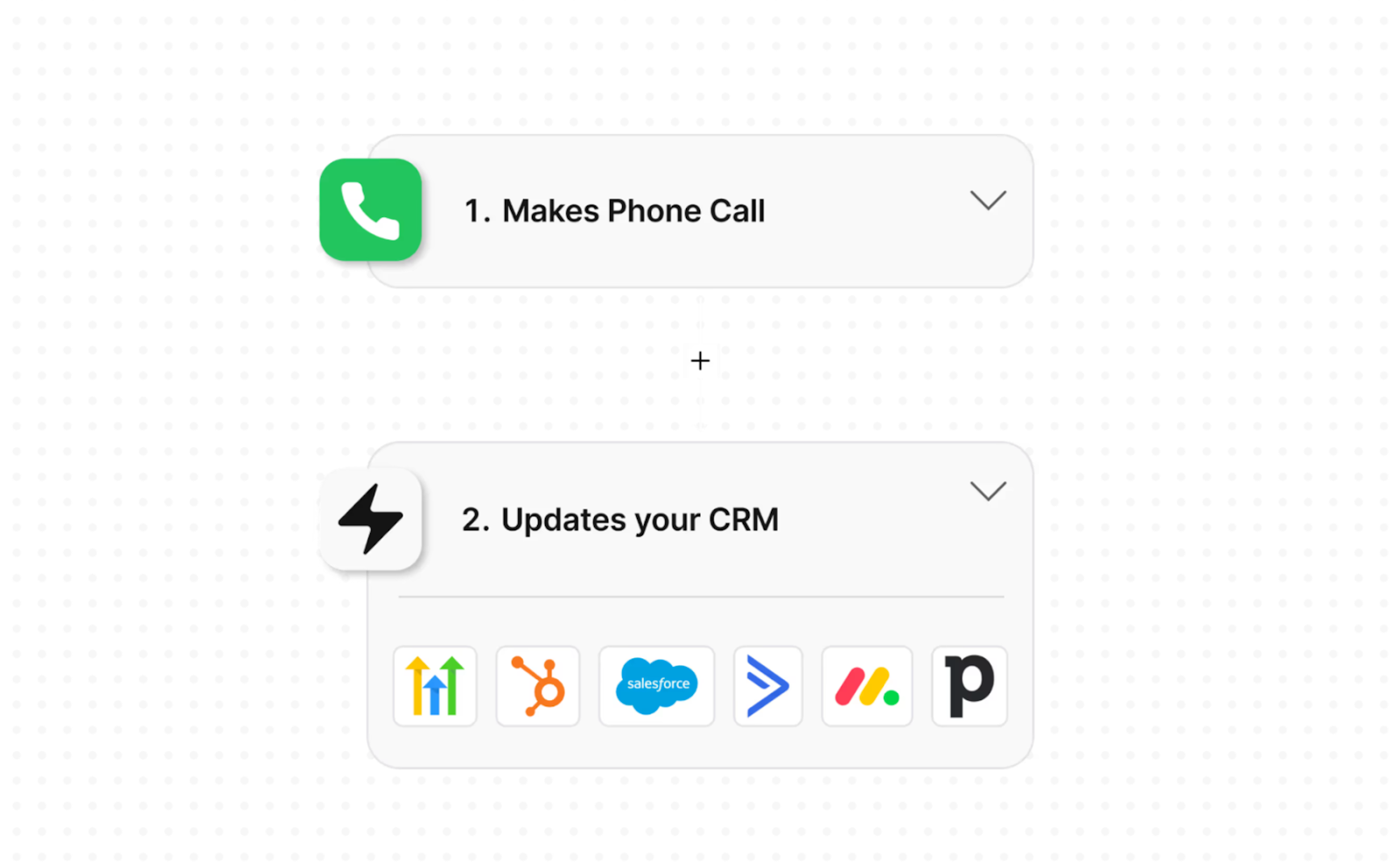
Retell's approach centers on custom prompt engineering and API-driven workflows. Lead qualification relies on crafting specific instructions within the agent's prompt, then using webhooks to capture qualified leads and push data to external CRM systems. This works but demands developer attention.Synthflow bundles lead qualification into its no-code builder. Teams can fortify and customize their own decision trees for lead screening, automatically capture qualification data in the process.
Even better for Synthflow users is that your teams sync up and send crucial information to preferred platforms (like HubSpot, Salesforce, Zoho, and other CRMs). Synthflow generously throws in integrations for popular CRM and automation platforms like HubSpot, Salesforce, and Zapier as part of the overall package.
Winner: Synthflow - They trump Retell when it comes to built-in lead qualification workflows and native CRM connections. Synthflow's focus on eliminating development overhead makes it a smart choice for low-code environments.
Appointment Scheduling
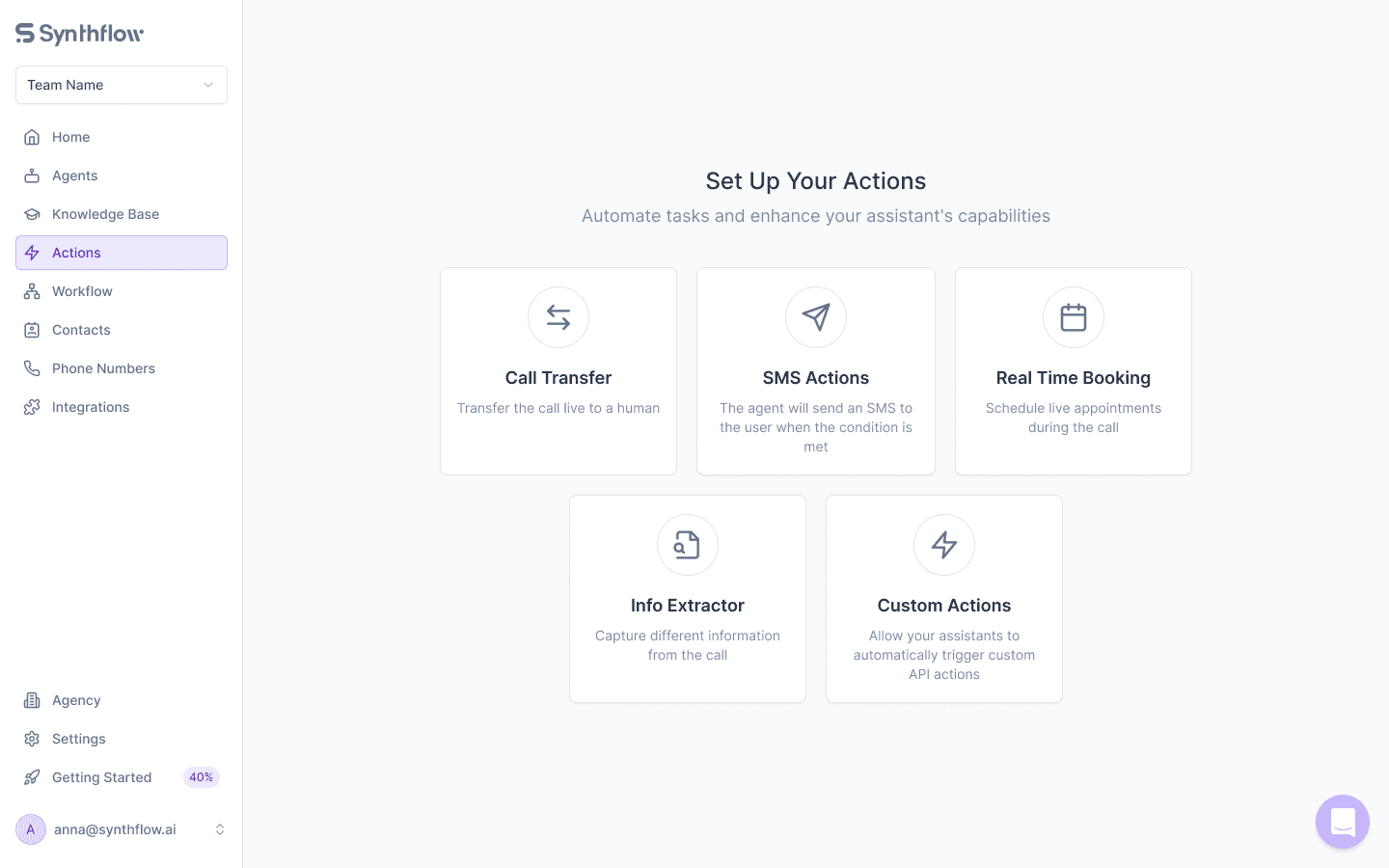
Both platforms support calendar integrations, but Retell requires developers to configure connections via its API. Calendar booking via Cal.com: AI agents can schedule appointments in real-time, though setup involves code configuration. Something that just adds time to the setup process and feels like an additional task.
Meanwhile, Synthflow's visual builder includes appointment booking workflows by default. Teams link their Google Calendar, Calendly, or other calendar systems directly within the platform. Confirmation reminders, rescheduling capabilities, and no-show prevention are all included without additional development.
Winner: Synthflow - Non-technical teams can set up appointment automation in minutes without touching code whereas Retell does make you work a little more for a feature that many just expect out of the box.
Call Intelligence & AI Customization
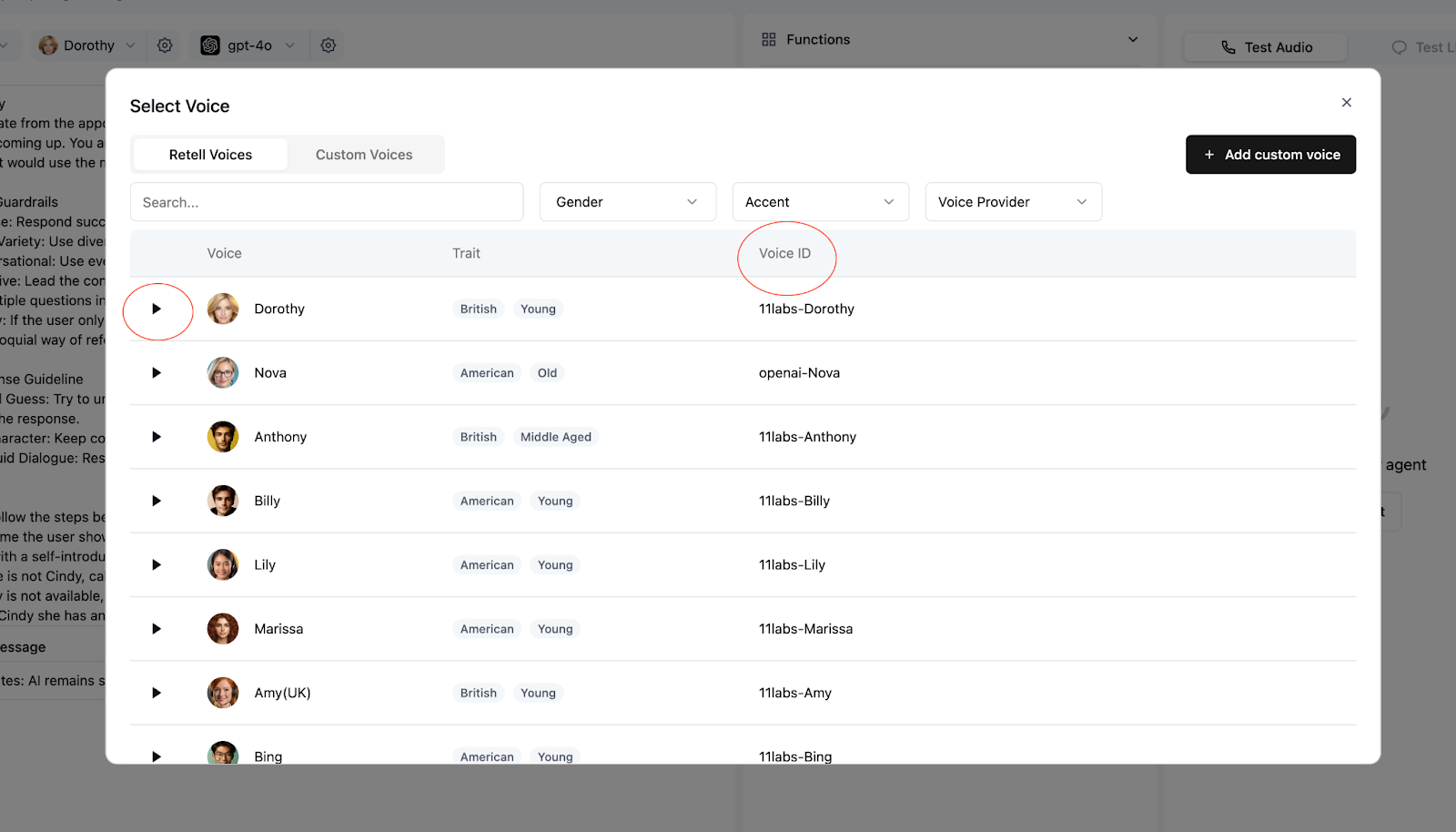
Retell excels here for teams with development resources. Synthflow offers visual customization through prompt templates and voice selection without requiring coding. Retell requires and feeds upon frontier models like GPT-4.1 and Claude, delivering startlingly human-like conversations with latency as low as 500ms. A plus we found was that your teams can bring their own language models, customize prompts down to granular levels, and control every aspect of conversation flow through code (assuming they're comfortable with it).
Synthflow conversely includes reusable components and supports multiple LLM options through an intuitive interface. While Synthflow's customization is less granular than Retell's code-first approach, it requires significantly less technical overhead.
Winner: Retell (for developers), Synthflow (for non-technical teams) - The ultimate choice depends on your team's technical capacity and customization needs, if you need something a little more personalized: Retell has a great approach that lets you see every piece of the puzzle interlock.
Analytics & Reporting
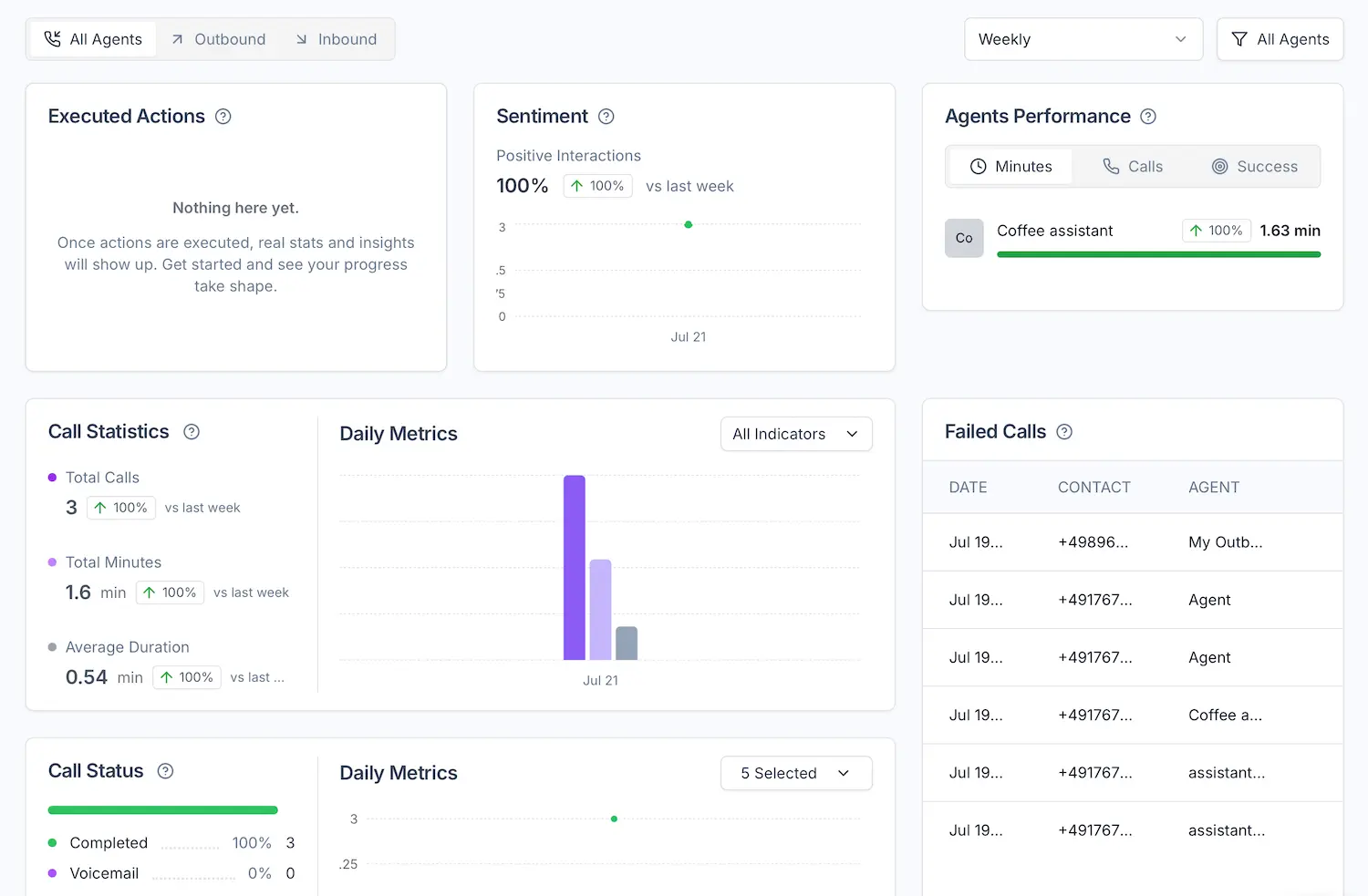
Retell AI's model may require more technical setup, which could delay deployment for businesses without dedicated technical resources for implementing AI voice agents. Synthflow's feel elementary but also more intuitive. On Retell's platform, basic call transcripts and latency metrics are available, though advanced analytics often require piping data to external observability platforms.
Conversely, Synthflow includes a comprehensive dashboard showing call metrics, transcripts, performance trends, and outcome data accessible directly from the interface. Reports can be generated without external tools. Retell’s reliance on third-party analytics tools to get to the heart of key performance metrics feels like another chore for teams who just need one hub for it all.
Winner: Synthflow - Readily accessible analytics without requiring additional infrastructure or technical configuration delivers a knockout performance for Synthflow in this category.
Integrations
Retell supports integrations but often needs additional configuration. Synthflow bundles key features like transcription, high-quality voices, SMS, and CRM integrations in each plan, saving time and preventing extra charges.
On Retell, your teams can connect to CRMs, calendars, and other platforms via webhooks and custom code. Still this just means more development work for your teams. BYOC telephony options with Twilio, Vonage, and SIP are available for organizations with existing infrastructure. Synthflow is just overall more generous thanks to its native connections to HubSpot, Salesforce, Zapier, and Make. The platform also supports Twilio and other telephony providers without custom configuration should you need it.
Winner: Synthflow - Native integrations reduce implementation friction and total deployment time. Retell just demands more work to get any external integrations working right.
Retell vs Synthflow: Pricing and Plans
Both platforms structure their pricing so distinctly, it's clearly because these tools serve different market segments. Retell operates off a modular usage-based model starting at $0.07+ per minute, charging additional fees for advanced features like premium voices and custom LLM integrations.
Retell doesn't offer a traditional free trial. It instead provides a modest $10 in credits before requiring businesses to commit to paid plans. Synthflow uses a tiered subscription model with bundled features and included minutes, offering a 14-day free trial for businesses to validate functionality before committing a budget.
Retell Pricing
Retell AI offers an intuitive drag-and-drop interface that allows users to get their AI voice agent live in just 3 minutes, though the backend pricing structure is modular. Retell AI's transparent $0.07+ per minute model serves as the base rate, with additional charges layered on top. A business using 1,000 minutes with Elevenlabs voice ($0.07), Claude 3.5 LLM ($0.06), and Retell's Twilio ($0.01) would incur around $0.14 per minute, or approximately $140 per month.
Retell AI also offers an Enterprise Plan with volume-based discounts, reducing rates to as low as $0.05 per minute for high-volume needs. However, Minimum spend for meaningful deployment starts at $3,000/month when combining all necessary features. All users receive $10 in free credits to start (approximately 60 minutes of usage). There's no platform subscription which is great because you pay only for what you use.
Synthflow Pricing
Synthflow bases pricing on anticipated monthly usage minutes. Plans start at $29 per month for small-scale use with limited minutes and concurrent calls. Mid-tier plans range from $375 to $750 monthly with thousands of minutes included and lower per-minute rates. High-volume plans provide 6,000 minutes for $1,250 per month.
Enterprise customers can negotiate custom pricing that includes compliance features, SLAs, SIP trunking, and volume discounts. The platform charges approximately $0.13 per minute, with additional fees for workflow usage and concurrent call capacity. They offer a free trial for up to 14 days.
Should You Choose Retell or Synthflow?
Retell offers developers the customization and control to build sophisticated voice AI from the ground up, while Synthflow lets non-technical teams launch production agents without writing code. Both are solid platforms, but they're built for completely different use cases, so picking the wrong one will cost you time and money.
Retell is Best For:
- Development teams building custom voice experiences: Organizations with engineering resources who need voice AI that connects to proprietary systems, implements unique business logic, or creates conversational experiences that pre-built platforms cannot support
- Companies with unique requirements that can't be met by pre-built platforms: Businesses in specialized industries or with complex workflows where off-the-shelf solutions lack the flexibility to handle domain-specific terminology, multi-step processes, or custom data integrations
- Organizations that want full control: Tech-forward companies with specific latency requirements, cost optimization goals, or data governance policies that demand choosing their own language models and infrastructure rather than vendor-locked solutions
Retell is Not Right For:
- Non-technical business teams seeking rapid deployment: Retell is not designed for business users or teams seeking no-code deployment workflows. Setting up production agents typically requires developer resources or external consulting, which might be a price too high to pay for some budgets
- Small businesses and startups with limited technical staff: The minimum effective spend and setup complexity can overwhelm teams without engineering capacity and feel like overkill
- Organizations who want predictable, flat-rate billing: Retell's modular model requires careful cost monitoring as usage scales, making budgeting less straightforward
Synthflow is Best For:
- Small to medium businesses without technical teams: The no-code platform with drag-and-drop interface launches voice agents without programming experience, allowing marketing teams and business owners to build agents independently
- Organizations requiring top-tier customer support: Enterprise clients on Growth and Agency plans receive private Slack channel access with 24/7 support, providing one-on-one relationships with support teams for quick issue resolution
- Businesses with existing CRM investments: Direct Salesforce and HubSpot integrations work out of the box, automatically syncing contact information and logging activities without middleware costs or maintenance
Synthflow is Not Right For:
- Businesses who need niche integrations: While Synthflow connects to common business tools well, organizations needing connections to proprietary legacy systems or unusual third-party platforms may find limitations
- Teams who need extreme conversation customization: The visual workflow builder handles most scenarios effectively but may feel limited to development teams wanting complete programmatic control over every conversation detail
- Low volume operations: The Pro plan's $375/month base cost includes 2,000 minutes, which honestly feels like overkill for businesses handling only occasional calls
Best for Small Businesses
Synthflow is the clear winner for small businesses. The no-code interface eliminates setup friction, the 14-day free trial lets you validate voice agents before committing budget, and bundled pricing prevents surprise costs as you scale. Small teams without engineering resources can have functioning AI agents handling calls within hours rather than weeks.
Our Pick: Synthflow - No-code setup and bundled pricing eliminate complexity for teams without engineering resources.
Best for Professional Services
Professional services firms will adore Synthflow's appointment scheduling, lead qualification workflows, and human escalation workflows because they take the guesswork out of basic tasks. Law firms, consulting practices, and agencies can automate intake calls, screen leads, and route touchy human-first inquiries to the right team members. That's without needing a whole other team of developers to build custom integrations. The CRM connectivity ensures client data flows seamlessly into existing systems.
Our Pick: Synthflow - Built-in appointment scheduling and lead qualification workflows make it easy to automate client intake without custom code.
Best for High Call Volume
Organizations handling 20,000+ monthly calls should evaluate Retell's enterprise pricing. At scale, negotiating per-minute rates down to $0.05 or lower can lead to a sea of cost savings compared to Synthflow's rigid $0.08/min model. But be warned, Synthflow's prices are that way because they assume responsibility for engineering resources to handle the setup and maintenance. Retell leaves you on your own for that. For high-volume operations seeking simplicity over per-minute optimization, Synthflow's Agency plan with 80 concurrent calls remains viable.
Our Pick: Retell - Enterprise discounts and modular pricing deliver significant cost savings at massive scale for technically equipped teams.
Is There A Clear Winner?
Synthflow and Retell serve fundamentally different customer archetypes. Retell targets development teams that view voice AI as a platform they'll customize extensively and manage closely. This does mean trading ease-of-use for maximum control and cost optimization at scale. Synthflow targets business teams that want working AI voice agents deployed quickly without engineering overhead. This time you trade per-minute rate flexibility for predictable bundled pricing and immediate time-to-value.
If your organization has internal engineering resources and operates at high volume (20,000+ minutes monthly), Retell's modular architecture and enterprise discounts justify the added setup complexity. If your team prioritizes speed-to-deployment, transparent billing, and built-in features without development work, Synthflow's no-code approach and fixed pricing deliver faster ROI. For most mid-market organizations without dedicated AI engineering capacity, Synthflow's simplicity and all-inclusive feature set make it the more practical choice. Still, Retell remains the right fit for technically inclined teams willing to invest development effort for maximum control.

